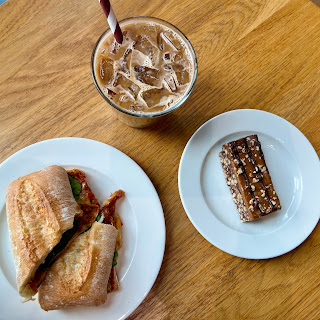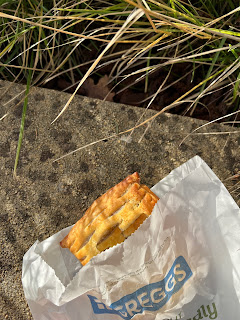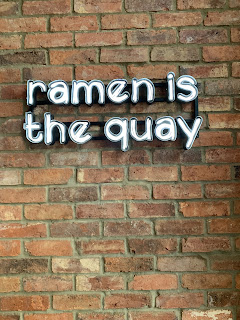5 Ways to be a part of National Vegetarian Week
Happy National Vegetarian Week! Whether you're a meat eater, vegan, or somewhere in between there are always ways you can help animals, yourself and the planet through your diet and lifestyle habits. Obviously not everyone can go fully vegetarian/plant-based/vegan but I can guarantee you that everyone can make even the smallest beneficial change.
1). Reduce the amount of meat/animal products in your diet
This may sound like an obvious one but you'd be surprised about how many different ways there are of doing this! If you currently have no restrictions on your diet you could choose a meal or even a day of the week to make meat-free - this could help you save money too! If you're vegetarian but currently still consume dairy products you could try switching to soya milk/other alternative milk products for use in hot beverages or swapping your vegetarian quorn (or other) meat substitutes for vegan ones. These changes could even be as small as just leaving out cheese in some of your meals.
2). Help the bees!
A more subtle one but important nonetheless. Bees pollinate an enormous range of plants; without them we would be very limited with what we could grow, not to mention the effect it would have on the environment overall. Ways you can help include planting a bee garden (check the list here) to increase the number of bees in your garden, and helping dopey bees you encounter. If you come across one that isn't moving on the floor, try giving it some sugar water on a spoon to try and help it to restore its energy. Refraining from buying honey and products containing it would also help (here is a video explaining why honey isn't vegan!)
3). Buy cruelty-free Makeup/beauty products
Sadly, even now make up is still needlessly tested on animals. It can be hard to keep up with which brands are suitable and which aren't, but it's definitely worthwhile as there are plenty of low-cost products that are wonderful AND haven't been tested on animals! As a rule of thumb, if it's sold in China it's probably been tested on animals as it's a legal requirement there. (Here is a super useful list of good brands. If you're looking for shampoo or other toiletries, Superdrug own brand is also cruelty free!)
Note: in this case, cruelty free labelled makeup ≠ vegan, so be weary that you may still accidentally be supporting animal industries.
4). Don't do it alone!
Making important changes such as becoming vegetarian or vegan can be challenging to do alone, so why not ask a friend or a family member to do it with you? Even starting off small with changes such as offering to cook a meat-free meal for your family once a week or making a pact with a friend to give meat up for Lent will be helpful and may even convince you to do it more long term!
5). Educate yourself
There's so much information out there on animal cruelty that it can be very overwhelming at first, but don't let this put you off! Ways to get involved and learn about what is going on and how you can help include:
1). Reduce the amount of meat/animal products in your diet
This may sound like an obvious one but you'd be surprised about how many different ways there are of doing this! If you currently have no restrictions on your diet you could choose a meal or even a day of the week to make meat-free - this could help you save money too! If you're vegetarian but currently still consume dairy products you could try switching to soya milk/other alternative milk products for use in hot beverages or swapping your vegetarian quorn (or other) meat substitutes for vegan ones. These changes could even be as small as just leaving out cheese in some of your meals.
2). Help the bees!
A more subtle one but important nonetheless. Bees pollinate an enormous range of plants; without them we would be very limited with what we could grow, not to mention the effect it would have on the environment overall. Ways you can help include planting a bee garden (check the list here) to increase the number of bees in your garden, and helping dopey bees you encounter. If you come across one that isn't moving on the floor, try giving it some sugar water on a spoon to try and help it to restore its energy. Refraining from buying honey and products containing it would also help (here is a video explaining why honey isn't vegan!)
3). Buy cruelty-free Makeup/beauty products
Sadly, even now make up is still needlessly tested on animals. It can be hard to keep up with which brands are suitable and which aren't, but it's definitely worthwhile as there are plenty of low-cost products that are wonderful AND haven't been tested on animals! As a rule of thumb, if it's sold in China it's probably been tested on animals as it's a legal requirement there. (Here is a super useful list of good brands. If you're looking for shampoo or other toiletries, Superdrug own brand is also cruelty free!)
Note: in this case, cruelty free labelled makeup ≠ vegan, so be weary that you may still accidentally be supporting animal industries.
4). Don't do it alone!
Making important changes such as becoming vegetarian or vegan can be challenging to do alone, so why not ask a friend or a family member to do it with you? Even starting off small with changes such as offering to cook a meat-free meal for your family once a week or making a pact with a friend to give meat up for Lent will be helpful and may even convince you to do it more long term!
5). Educate yourself
There's so much information out there on animal cruelty that it can be very overwhelming at first, but don't let this put you off! Ways to get involved and learn about what is going on and how you can help include:
- Finding vegetarians and vegans on social networks such as Facebook pages or Twitter; the vast majority of us will be more than happy to point you in the right direction and answer any questions you may have!
- Watch documentaries: There are so many good ones available, Cowspiracy and Earthlings are both good places to start
- Learn about what's in your food: Did you know that the World Health Organisation has classed processed meat as a Group 1 Carcinogen (meaning there is strong evidence it causes cancer) and red meats as a Group 2A Carcinogen (meaning it "probably causes cancer")? Or that milk is legally allowed to contain up to 400 million pus cells per litre? Information like this is readily handy, and it pays off to know what you're putting in your body! [source 1] [source 2] [source 3]
- Understanding vocabulary: Here are some terms you may well come across and what they mean:
- Vegetarian: The vegetarian society defines vegetarian as someone who "does not eat foods that consist of, or have been produced with the aid of products consisting of or created from, any part of the body of a living or dead animal. This includes meat, poultry, fish, shellfish*, insects, by-products of slaughter** or any food made with processing aids created from these." [source]
- Vegan: Someone who doesn't consume animal products or use any in their everyday life, and doesn't believe animals should be used for human gain.
- Plant-based: Often used interchangeably with vegan but has a slightly different meaning. Plant-based usually refers to someone who doesn't consume any animal products but may still use them, e.g. wearing wool or using makeup products containing bees wax
- Pescatarian: Someone who excludes all meat but fish from their diet
- Raw Vegan: A vegan who, as the name suggests, only eats plant-based foods that have not been cooked above 48°c, and also tend to avoid heavily processed foods.
- Carnist: Someone who follows the ideaology that humans were "made" to consume and use animals for personal gain
No matter your preferred diet, have a great week and remember any change no matter how small helps!




Comments
Post a Comment